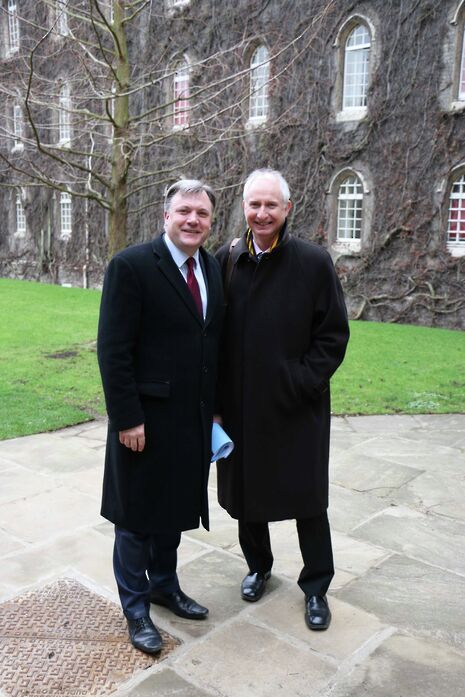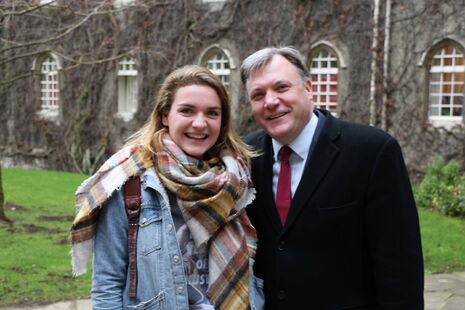Ed Balls comes to Cambridge
The Shadow Chancellor avoids difficult questions on HSBC, Labour party funding and tuition fees as he gives out free pizza

Shadow Chancellor of the Exchequer Ed Balls visited the university yesterday as part of Labour’s campaign in the run up to May’s general election.
The event, organised by the Cambridge University Labour Club (CULC), took place in St John’s, and students were given the opportunity to question Balls on Labour’s policies and plans ahead of the launch of their full manifesto in April.
Balls was twenty minutes late, possibly waiting for the stack of Domino’s pizzas that he brought with him and proceeded to pass round to the students, which led to him asking for more time before answering a question because his mouth was full.
The questions started tamely, but soon began to challenge the Shadow Chancellor. Speaking directly to Varsity, Balls was reluctant to be drawn into the ongoing fallout from the leaked HSBC files, which have revealed substantial donations from holders of Swiss bank accounts to the Conservative and Labour parties.
He argued that Labour was working “in a world where that’s the system” and so tried to “minimise our disadvantage”, hence the acceptance of large personal donations and loans from wealthy individuals as “that’s the only way to access funds at the moment other than from individual donations”.
These comments come after Labour leader Ed Miliband called David Cameron a “dodgy Prime Minister” for failing to answer questions on allegations of tax avoidance during Prime Minister’s Questions on Wednesday, which allegedly implicated top Tory donors, but also included Labour Party donor and former Deputy Speaker of the House of Lords, Lord Paul.
In light of the ongoing controversy, Balls conceded that large individual contributions are “far from” an “ideal way of funding political parties,” and instead advocated a “move towards a completely different model of party funding” with “a really quite low cap on individual donations”.
These suggestions for a cap on individual donations come as the Financial Times this week revealed that such donations to the Labour Party have slumped to less than half of previous levels. The party received only £8.7m from private donors thus far in the course of this parliament, compared to £20.7m in the same period in the last parliament.
Balls contrasted Labour’s position with Conservative spending on the upcoming election. He claimed the Tories are predicted to outspend Labour by “seven or eight to one”.
The Shadow Chancellor also criticised the government on the issue of representation, claiming that the current Cabinet was “much less representative of the real world” than 20 years ago, and criticising both the Tories and the Lib Dems for not doing enough to promote women in Parliament.
Balls was also pressed by the Mayor of Cambridge, Cllr Gerri Bird (Lab), on the current government’s cuts to student disability allowances. After first confessing that he was “not sure if [he] know the details of this particular student thing,” the Labour parliamentary candidate for Cambridge, Daniel Zeichner, stepped forward and claimed the party “want to look at it and see what [they] can do”, a response that Balls repeated almost verbatim.

Balls’ lack of knowledge on Labour’s stance drew laughter from the CULC audience, but he grew in confidence on the issue, and finished by saying that he wants “every young person to have a chance to succeed” and “have the same chance as any other student going to university”, before criticising the government for cutting funding for disabled students.
The student-centric question-and-answer session promptly moved onto a key electoral issue for this demographic: higher education fees. When pressed, Balls refused to offer any new announcement as to how Labour will fund this policy area, despite criticism from Universities UK that Labour’s plans would amount to a £10 billion funding gap.
Balls reassured the audience that Labour were working hard on finding ways to improve what he called a “pretty flawed” system, but did not disclose when Labour would be announcing its full proposals.
“Not today, not today, but we are going to be talking about it before the election, I promise you.”
The Shadow Chancellor hinted at his personal preference for a graduate tax model of higher education funding rather than a fees-loan system, a possibility that has already been repeatedly floated by senior party figures, including Shadow Minister from Universities Liam Byrne. Labour leader Ed Miliband has also repeatedly suggested higher education policy could be changed in this direction.
Hinting that the current £9,000 fee would be changed because “I want to change it”, Balls referenced the claim that almost half of current university students will not repay their fees during their working lives, thus concluding that the system “isn’t working for students or for the taxpayer”.
 Interviews / You don’t need to peak at Cambridge, says Robin Harding31 December 2025
Interviews / You don’t need to peak at Cambridge, says Robin Harding31 December 2025 News / Unions protest handling of redundancies at Epidemiology Unit30 December 2025
News / Unions protest handling of redundancies at Epidemiology Unit30 December 2025 Comment / What happened to men at Cambridge?31 December 2025
Comment / What happened to men at Cambridge?31 December 2025 Features / ‘Treated like we’re incompetent’: ents officers on college micromanagement30 December 2025
Features / ‘Treated like we’re incompetent’: ents officers on college micromanagement30 December 2025 Theatre / We should be filming ADC productions31 December 2025
Theatre / We should be filming ADC productions31 December 2025









